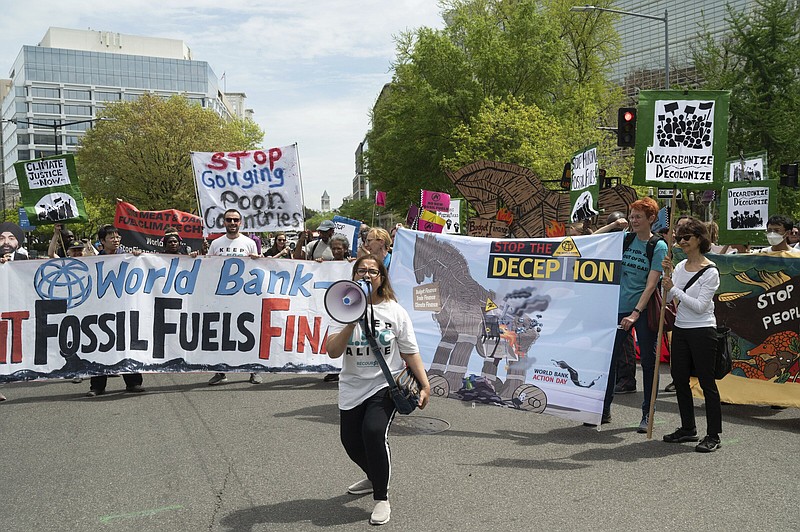WASHINGTON -- As leaders from around the world are in Washington this week for the spring meeting of the World Bank, workers who serve food to dignitaries at the poverty-fighting organization's headquarters are trying to bring attention to what they see as a galling situation: The workers who put food on the table for the organization are struggling to get by.
Andre Blount has been serving food at World Bank headquarters for nearly 10 years. He said he's gotten exactly one raise -- for 50 cents.
Union leaders claim 25% of the World Bank food workers employed as a contract laborers through Compass Group North America receive public benefits such as food stamps just to make ends meet.
"It's sickening," Blount, 33, said as he joined red-shirted union members this week on a picket line outside the development bank on a hot afternoon. "They go around the world looking for how to help people, but you have hundreds of employees in D.C. who are struggling."
Inside, meanwhile, suited-up professionals were striding through a lobby where "End Poverty" T-shirts and tote bags are for sale.
The building's expansive cafeteria overlooks an indoor pond and caters to even the most particular palates. There's a soup station called "Ladle and Crust," a "Mediterranean Table" station serving hummus and tabouli, and a sushi chef offering made-to-order rolls and sashimi.
A nearby fine dining room for diplomats and special guests of the bank was hosting lunch for delegations from India, Bangladesh, Bhutan and Sri Lanka.
Many of the food service workers, it turns out, come from countries to which the development bank sends missions.
Blount, after a decade on the job, said he's paid $18 an hour, above D.C.'s minimum wage of $16.10. He says feeding some of the world's most important people in a variety of service and catering roles should pay more than the legal minimum.
Blount, a member of the Unite Here Local 23 chapter, is one of roughly 150 Compass workers employed at the World Bank. They are in the midst of contract negotiations, seeking higher wages and better health care benefits.
World Bank spokesperson David Theis said that while the bank is not a party to talks between the union and Compass Group, the bank's staff has "deep admiration and respect" for their food service colleagues. He said the bank ensured the workers were paid throughout the pandemic.
While $18 per hour may seem like a lot in some areas, the Massachusetts Institute of Technology's "living wage" index lists $22.15 per hour for D.C.
Beginning July 1, the minimum wage in D.C. will increase to $17 per hour for all workers, one of the highest minimums in the country. The increase comes as persistent high inflation eats at workers' paychecks and the median rent in Washington is $2,571, according to Zillow.
"The World Bank says its mission is to promote shared prosperity by increasing the incomes of the poorest 40% of people in every country," Unite Here President D. Taylor said on a call with reporters.
"We think that first starts in the United States, by compensating food service workers here. They work hard every day yet struggle to pay their bills."
Compass Group spokesperson Lisa Claybon said the firm was bargaining in good faith and eager to reach a fair agreement. She added that the company has "long history" of working to "do what's best for our employees and clients."
The current negotiations also cover Compass workers who serve food at the Smithsonian, the Kennedy Center for the Performing Arts and the National Institutes of Health.
Alex Campbell, director of the International Trade Union Confederation's D.C. office, said workers around the globe "are suffering from a cost-of-living crisis that they didn't cause."
"To end poverty and promote shared prosperity in this turbulent moment, workers everywhere need decent living standards, basic rights on the job, and collective bargaining," Campbell said. "That's true from Compass employees here in D.C. to workers on projects funded by the World Bank Group anywhere in the world."
Blount said he simply believes that his job should pay him what he's worth. He added, "If I were to get a raise from Compass Group, it will help with saving up emergency funds, paying my bills on time instead of being late."

